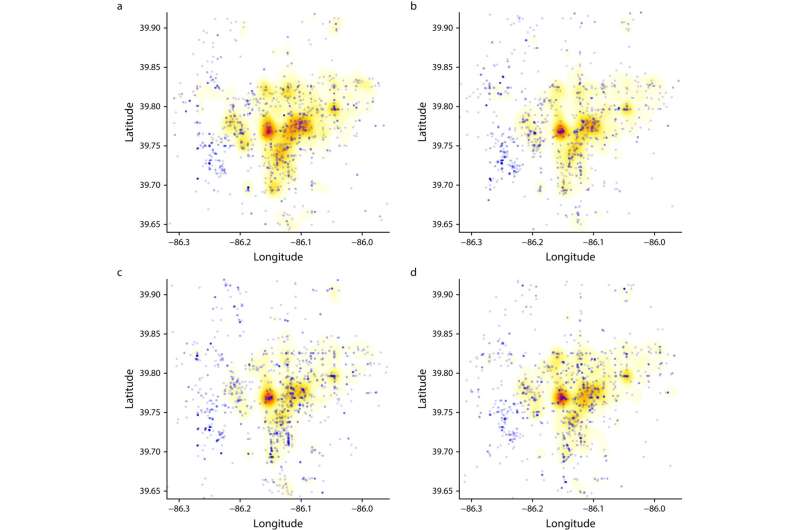This article has been reviewed according to Science X's editorial process and policies. Editors have highlighted the following attributes while ensuring the content's credibility:
fact-checked
peer-reviewed publication
trusted source
proofread
Fatal overdoses increase after police seize drugs, study finds

For decades, efforts by police to seize illicit drugs have been a cornerstone strategy for disrupting drug markets and removing drugs from communities. But there's an unintended outcome when opioids are seized, a new study finds—increases in overdoses, including those that are fatal.
The study found that police drug seizures were associated with increases in fatal overdose in the surrounding geographic area in the three weeks following enforcement, possibly by leading people with substance use disorder to take greater risks when they tried to restore their supply. The study, published in the American Journal of Public Health, raises questions about policies that might be exacerbating overdoses during a persistent epidemic that is contributing to reductions in the nation's life expectancy.
The findings provide evidence that efforts to disrupt drug markets can have unintended effects in generating public harm, said Bradley Ray, a senior researcher at the nonprofit research institute RTI International who led the study.
"It's concerning to think routine drug enforcement can exacerbate harms, so we need to focus on mitigating these sources of overdose risk," Ray said.
Brandon del Pozo, an assistant professor (research) at Brown University's Warren Alpert Medical School and School of Public Health, co-authored the study. Del Pozo spent 19 years at the New York City Police Department and four years as chief of police of Burlington, Vermont, where he directed the city's response to the opioid crisis. The study highlighted the "collateral consequences" of law enforcement seizures of drugs, del Pozo said.
"To be truly effective in reducing overdose deaths, policing strategies need to be comprehensive," he said. "That means taking into account all the outcomes of police work, not just the effect of incapacitating drug dealers, but also how seizing drugs disrupts sales in a community, and how those disrupted sales affect usage patterns, and how those usage patterns affect an individual's health and safety. According to this study, we have evidence that seizing opioids increases exposure to overdose."
To conduct the study, the research team used two years of administrative data from Marion County, Indiana, to compare different types of drug seizures with subsequent changes in fatal overdoses, nonfatal overdose calls for emergency medical services and naloxone administration in the surrounding area.
They found that within seven, 14 and 21 days, opioid-related seizures of drugs by police were significantly associated with increased overdoses within 100, 250 and 500 meters of the seizure location. Most notably, the number of fatal overdoses was two-fold higher than expected within seven days and 500 meters following an opioid-related incident in which police seized drugs.
The researchers hypothesized that the increase in overdose events was because people who use opioids will generally seek out a new supply after losing access to their previous drug supply, and that new supply will have unknown potency. In addition, in the time period between losing the familiar supply and finding a new one, people using opioids can experience diminished tolerance to drugs. Accidentally ingesting a dose beyond one's tolerance can be fatal.
"One of the risks of the illicit drug market is uncertainty about what constitutes a safe dose," Ray said. "If people who use drugs lose access to their usual supply, they are forced to find an unknown supplier, which introduces uncertainty about what is in the drugs they procure, thereby increasing overdose risk."
Fentanyl—a highly potent opioid often used to lace other heroin or cocaine that has come to dominate the illicit opioid market—is driving the fatality count in opioid- and stimulant-involved overdose deaths, the researchers noted. Much of the drug supply is now contaminated by fentanyl, which is lethal even in small doses.
"The ubiquity of fentanyl in the drug supply affords people who use drugs almost no margin of error if they make a dosing mistake," del Pozo said.
The study findings, del Pozo said, can inform a more effective law enforcement strategy for preventing overdoses. For example, he said that it's important to ensure that a drug seizure in a particular area is also accompanied by targeted harm reduction approaches such as outreach services, links to treatment, increased naloxone distribution and programs that test illicit drugs for the presence of fentanyl.
"If the seizure of drugs by law enforcement is going to continue to be a part of the strategic response to the country's overdose crisis, then it has to take into the account that at least in the short term, seizing drugs increases overdoses," del Pozo said. "Part of the mission of drug enforcement is to save lives, and with the current approach, it's doing the opposite."
More information: Bradley Ray et al, Spatiotemporal Analysis Exploring the Effect of Law Enforcement Drug Market Disruptions on Overdose, Indianapolis, Indiana, 2020–2021, American Journal of Public Health (2023). DOI: 10.2105/AJPH.2023.307291. ajph.aphapublications.org/doi/ … 105/AJPH.2023.307291



















